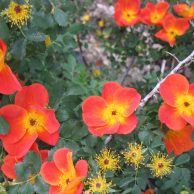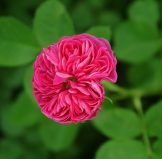 Did your roses take a hit from the winter cold and strong winds we just experienced? Perhaps they look as though they didn’t make it, showing brown, shriveled canes and no new growth above the ground. Or maybe there are no signs of life on the canes, but there is new growth just coming up from the ground. Either way, if your roses are growing on their own roots, you’re in luck. If they were grafted onto a rootstock, the prospects are not so good.
Did your roses take a hit from the winter cold and strong winds we just experienced? Perhaps they look as though they didn’t make it, showing brown, shriveled canes and no new growth above the ground. Or maybe there are no signs of life on the canes, but there is new growth just coming up from the ground. Either way, if your roses are growing on their own roots, you’re in luck. If they were grafted onto a rootstock, the prospects are not so good.
Grafted roses are produced by grafting a scion from a particular variety onto a rootstock that is chosen for your geographic area. The ‘graft union’ or ‘bud union’ is the point at which the scion and the root stock have grown together. Unfortunately, it is the most cold-sensitive area of the plant. We often hear stories of a rose with very double yellow flowers (or pink, purple, etc.) that was purchased and planted and bloomed as advertised the first year, but came back the following year bearing dark red single blooms with a white center. Go figure! What happened is that the graft union froze to death in the winter, and what came up the next spring were suckers from the rootstock. For a vast portion of the US, including Colorado, the rootstock used is called ‘Dr. Huey’. It’s an older, very vigorous variety that grows tall, often 8’, blooms only in spring, with dark red, almost single flowers that have a white center and no fragrance.

Desiree Parmentier rose
‘Own-Root’ roses take longer to produce for sale, and consequently they cost more. Cuttings are taken from a rose variety, they are prepared, and rooting hormone is applied. Then the cuttings are inserted in a growing medium and kept under a mist system in a greenhouse until roots are established. They are then moved into larger pots and grown until they are well-rooted and are large enough to sell.
Perhaps the biggest advantage to own-root roses is that even when canes are killed back to the ground, the new canes that emerge will be the very same variety that you chose. In addition, roses grown on their own roots are stronger and more vigorous, far less prone to virus infections, and longer-lived.
All of our roses are grown on their own roots. We are receiving a delivery this week of many wonderful hardy roses on their own roots. They will arrive in 4” pots and will be for sale in this size until the weather heats up. At that point, the roses will use the water in their pots quickly and be prone to drying out. So we will need to transplant them into larger pots and let them root before they can be offered for sale again later in the season.
